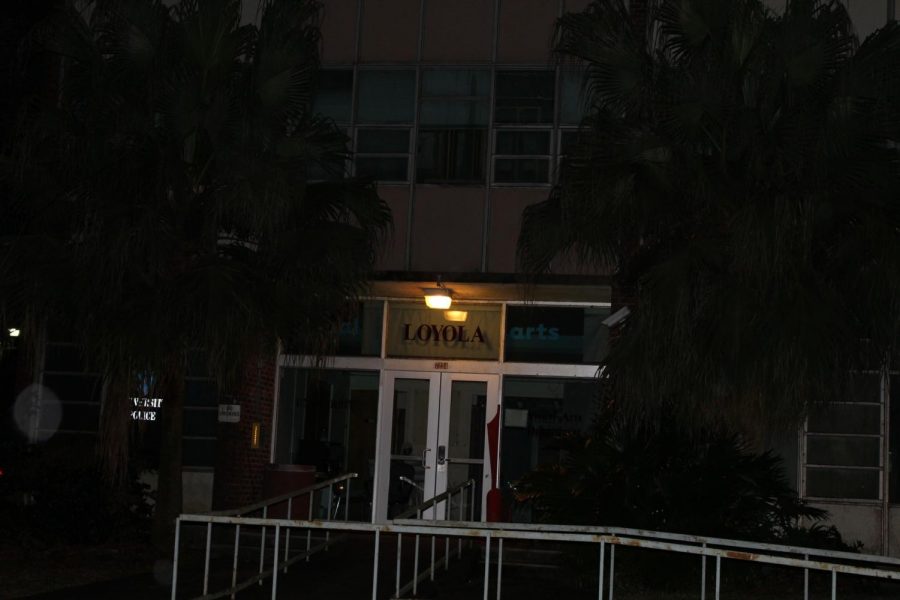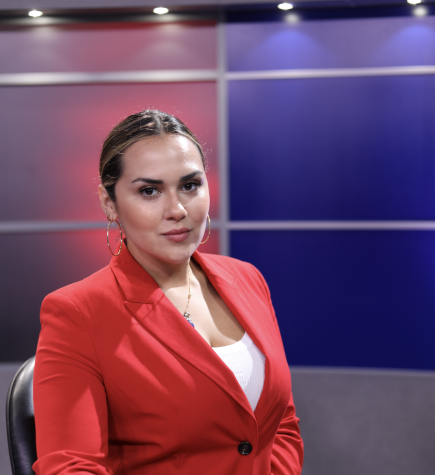Law center focuses on service
The Gillis Long Poverty Law Center is illuminated by lamp light the night of March 1. Internships afforded to law students through the Center train them to represent clients who need financial support to navigate court. Photo credit: Shadera Moore
March 6, 2021
Nestled between St. Charles Avenue and Broadway Street in New Orleans lives a place where people who don’t know where to go and those moved to help them can be found.
The Gillis Long Poverty Center at Loyola’s law school dedicated itself to social justice lawyering for members of the community more than 30 years ago, and through numerous presidencies, racial violence and a pandemic, they continue to be available for those in the community who need support.
The poverty center offers internships to law students at Loyola with a goal that they may assist in offering free resources and representation to the surrounding community.
Melia Cerrato, a third year law student, did her first of three internships for Gillis Long the summer after her first year of law school at Loyola. She said she worked with an education clinic then, representing parents of students with disabilities in special education programs. Since then, Cerrato said she’s worked in family law and for a youth justice clinic, learning how to interview survivors of domestic violence, file protective orders as well as represent clients who are in juvenile delinquent proceedings.
Andrew Maberry, Loyola law school graduate and former social justice fellow for Southeast Louisiana Legal Services, used his experience with the center to influence his 2019-2020 fellowship in “re-entry” work, which refers to statewide criminal justice reform with a goal of preventing incarcerated people from returning prison.
Maberry and his colleagues at Southeast Louisiana Legal Services would apply for food stamps, assist in finding suitable housing, apply for social security benefits and clear any debts on individuals’ credit that may have popped up while they were incarcerated.
Maberry said the center also prepared him to assist individuals in expunging their criminal records. This allowed individuals with a criminal record to again be able to apply for jobs, obtain housing and enroll in job training programs.
The center has funded more than 800 summer internships. It also supports Loyola law graduates in its Loan Repayment Assistance Program where graduates can apply for financial assistance to make payments on student loans, Ramona Fernandez, director of the law clinic said.
“We mentor students and facilitate placements into social justice internships,” Fernandez said. “Students share feedback with us that those experiences are amongst the most memorable of their law school experiences.”
Despite the work the center led him to do, Maberry said he did not expect to get involved in the center when he started law school. Regardless, Maberry said he credits Gillis Long as the only reason he went into social justice law.
“Gillis Long introduces you to this real world and helps you craft the tools you need to be a successful lawyer,” Maberry said. “I would not be the lawyer I am today had it not been for the numerous opportunities they gave me.”
For Cerrato, the same is true; the Gillis Long Poverty Center allowed her to gain all skills necessary to be an attorney.
In his third year of law school, Maberry said he was able to represent a client in court. After prepping for hours, he won the case, and the victory brought the client to tears.
“The amount of joy on this person’s face really stuck out to me,” Maberry said. “It made me realize that sometimes, people just need a little help; they just need someone to speak for them when they feel like the law has silenced them. I often think back to that day when I need a reminder about why I do what I do.”
Fernandez said that without Gillis Long, it is likely that many low-income and vulnerable people may not have received legal representation.
“This center was founded to give students and graduates the opportunity to engage in lawyering for those who would not otherwise have access to legal services,” Fernandez said.








